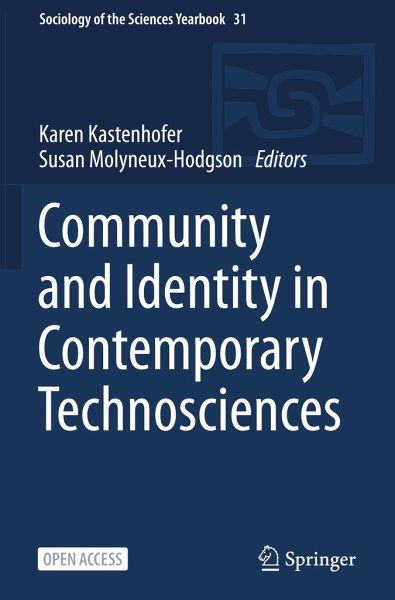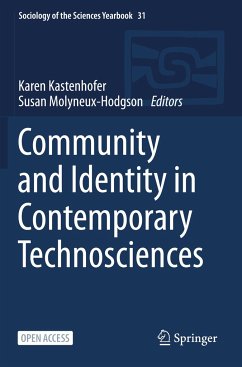
Community and Identity in Contemporary Technosciences
Versandkostenfrei!
Versandfertig in 6-10 Tagen
38,99 €
inkl. MwSt.

PAYBACK Punkte
19 °P sammeln!
This open access edited book provides new thinking on scientific identity formation. It thoroughly interrogates the concepts of community and identity, including both historical and contemporaneous analyses of several scientific fields. Chapters examine whether, and how, today's scientific identities and communities are subject to fundamental changes, reacting to tangible shifts in research funding as well as more intangible transformations in our society's understanding and expectations of technoscience. In so doing, this book reinvigorates the concept of scientific community.Readers will dis...
This open access edited book provides new thinking on scientific identity formation. It thoroughly interrogates the concepts of community and identity, including both historical and contemporaneous analyses of several scientific fields. Chapters examine whether, and how, today's scientific identities and communities are subject to fundamental changes, reacting to tangible shifts in research funding as well as more intangible transformations in our society's understanding and expectations of technoscience. In so doing, this book reinvigorates the concept of scientific community.
Readers will discover empirical analyses of newly emerging fields such as synthetic biology, systems biology and nanotechnology, and accounts of the evolution of theoretical conceptions of scientific identity and community. With inspiring examples of technoscientific identity work and community constellations, along with thought-provoking hypotheses and discussion, the work has a broad appeal. Those involved in science governance will benefit particularly from this book, and it has much to offer those in scholarly fields including sociology of science, science studies, philosophy of science and history of science, as well as teachers of science and scientists themselves.
Readers will discover empirical analyses of newly emerging fields such as synthetic biology, systems biology and nanotechnology, and accounts of the evolution of theoretical conceptions of scientific identity and community. With inspiring examples of technoscientific identity work and community constellations, along with thought-provoking hypotheses and discussion, the work has a broad appeal. Those involved in science governance will benefit particularly from this book, and it has much to offer those in scholarly fields including sociology of science, science studies, philosophy of science and history of science, as well as teachers of science and scientists themselves.












